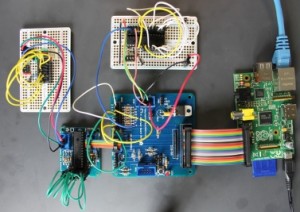lobstar and 7 segment I2C display - part 1
One of the last projects that Quick2Wire worked on before the company ceased trading was a display based on the nxp SAA1064 controller and a 7-segment display. There's still a stock of the Quick2Wire boards over at SK Pang, but Quick2Wire never finished the 7-segment design.
I'm thinking of restarting that project and I spent a little time this afternoon looking at what would be involved.
It seems that the DIP version of the controller is no longer manufactured, and the only display I could find in my parts box is also no longer made. I don't think either of those issues is insurmountable; there seem to be a lot of the DIP chips for sale on eBay, and I guessed that the display pinout was probably the same as you find in more up-to-date displays from the same manufacturer.
I was fairly sure that the display was a common-anode type, which the controller requires; I quickly lashed up a test circuit using a lobstar and checked the connections.
Success! The display has the same pinout as the Agilent HDSP-521G, which is a current product.
I'll start by breadboarding a lobstar-controlled version and then look at what's involved in controlling it from the Raspberry Pi.
I'm thinking of restarting that project and I spent a little time this afternoon looking at what would be involved.
It seems that the DIP version of the controller is no longer manufactured, and the only display I could find in my parts box is also no longer made. I don't think either of those issues is insurmountable; there seem to be a lot of the DIP chips for sale on eBay, and I guessed that the display pinout was probably the same as you find in more up-to-date displays from the same manufacturer.
I was fairly sure that the display was a common-anode type, which the controller requires; I quickly lashed up a test circuit using a lobstar and checked the connections.
 |
| lobstar and 7 segment display |
I'll start by breadboarding a lobstar-controlled version and then look at what's involved in controlling it from the Raspberry Pi.



Comments
Post a Comment